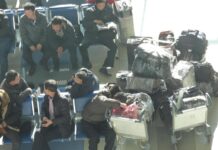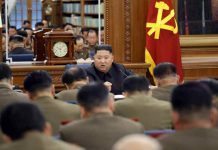The North Korean economy has continued to decline since the outbreak of COVID-19. According to key North Korean economic indicators for 2023 released by South Korea’s National Statistical Office last month, North Korea’s GDP was KRW 36.2 trillion (about USD 27 billion). This was an improvement from the previous year (KRW 35.9 trillion), but real GDP – which reflects inflation – fell by 0.2%. North Korea’s real GDP will shrink for three consecutive years: -4.5% in 2020, -0.1% in 2021, and -0.2% in 2022.
The most direct cause of negative growth is trade. In January 2020, North Korean authorities closed all routes out of the country without warning. Trade officials, who regularly talked and worked with overseas traders, found themselves in a difficult situation when they were suddenly unable to receive import goods they had purchased or payments for exports they had sent.
“A,” an official at a major trading company affiliated with the North Korean Ministry of Defense who was recently interviewed by Daily NK, said he felt that his “lifeline was suddenly completely cut off” when the border was sealed. Individual traders have had to absorb the losses caused by the border closure, with many going completely bankrupt. In fact, several of A’s colleagues took their own lives when they ran up massive debts during COVID-19.
Last year, as the North Korean authorities expanded trade from previous years, trade officials hoped that the authorities would relax import and export controls. But the authorities appear to be using the unitary state trade system – revived in the name of fighting COVID – to maintain internal control. “A” says that he feels stifled by the recent frequent orders restricting trade.
Daily NK: Has the Ministry of External Economic Relations issued any trade policies or directives since the New Year?
“It issued a directive on Jan. 15. The ministry said that we must proceed with our North Korean-style unitary trade system and urged us to express our firm will to foreign traders as well. Broadly speaking, there were two specific directives. The first ordered us to distinguish traders and items smeared with reactionary thought, and the second was to make traders we can work with on a long-term basis ideological comrades, so that they’ll let you buy what we need immediately on credit or for free, even if they suffer some debt, by getting them to join the revolutionary ranks. The foreign traders we work with are not North Korean citizens, so I don’t know how to get them to understand our trade policy. [The authorities] tell us to be party propagandists while making money from trade, but how is that possible? They told us to distinguish foreign companies, agencies, and merchants who are colluding with the DPRK and not to leave any room for the enemy’s trade sector. They’re even telling us to trade on the basis of North Korean ideology, so you can probably guess how they think things will turn out.”
Daily NK: During the general review of trade agencies late last year, North Korea reportedly issued new waku (trade permits). Has the number of waku holders increased with the expansion of trade?
“No. The government just reissued waku to state-run trading companies and agencies or people who had them before. You needed to submit many documents to get your waku reissued, and the criteria was quite strict. Before COVID-19, you needed to submit 10 or fewer certificates and documents to receive a waku, but this time, you needed to submit over 20. And the hardest thing is proving what kind of people the traders in China [you deal with] are. Moreover, nowadays, the state involves itself in the affairs of even small provincial trading companies. Even conducting a single trade transaction is hard with so many rules and regulations.”
Daily NK: What items has the state recently ordered you to import? Is the country importing items that the people need?
“Both imports and exports requested by the state have returned to normal levels. Government agencies are asking for everything, including jewelry, high-end clothes, liquor, glasses, teakettles, shoes, bags, and high-heeled shoes. Imports for ordinary people are relatively small in quantity and variety. The only thing that has been coming in lately is clothing materials.”
Daily NK: Trade between North Korea and Russia has been brisk since the Russo-Ukrainian war began. Of course, trade with China accounts for a much larger share, but it appears that the North Korean authorities are also working hard on trade with Russia.
“If we call Russia a flash of lightning, China is like an everyday lamplight. That is, trade with Russia is brisk now, with a lot of volume, but [the authorities] don’t think it will last long. China is like a long-lasting lamp that stays lit as long as you keep adding oil. But if you keep an oil lamp burning, your nostrils will turn black. Our nostrils have already turned black after relying on China for so long. Even though we know this, we keep the lamp lit because if we don’t continue to trade with China, we will go completely dark. I think our current trade situation is quite dark, with the lamp hardly lit.”
Daily NK: What do trade officials wish for in the New Year?
“During COVID-19, I barely got by by borrowing money from my relatives or friends. Even though I felt humiliated and despised as a trader, this year I want to say thank you to the family members and friends who gave me even a kilogram of rice or a little money by earning some cash and buying them things like clothes, shoes, rice cookers, or cell phones.
“There’s only one thing I expect from the government. Since we’re going to find things to trade, the government should leave the trading to us. And it should talk with us, the trade officials, about waku and import and export targets. Trade should be conducted through a balance between foreign countries and our nation, not through a unitary ideological system. The trade officials who survived the COVID-19 pandemic are veterans of the trade business, and their lives depend on it. The state shouldn’t waste time on regulations and should trust the traders and trade agencies working in the field.”
Translated by David Black. Edited by Robert Lauler.
Daily NK works with a network of sources living in North Korea, China, and elsewhere. Their identities remain anonymous for security reasons. For more information about Daily NK’s network of reporting partners and information-gathering activities, please visit our FAQ page here.
Please send any comments or questions about this article to dailynkenglish@uni-media.net.



















